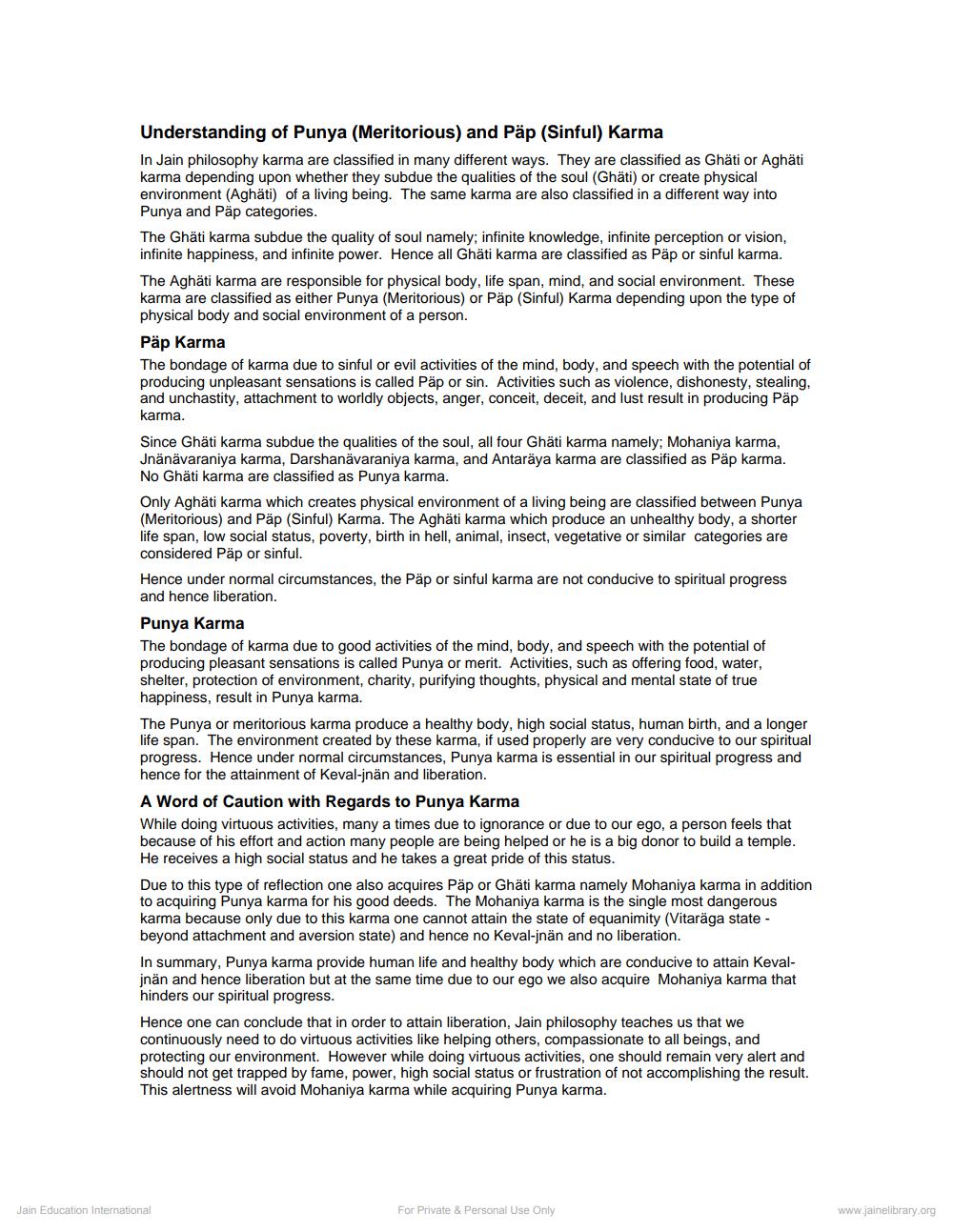Book Title: Punya and Pap Karma Author(s): Pravin K Shah Publisher: JAINA Education Committee View full book textPage 1
________________ Understanding of Punya (Meritorious) and Päp (Sinful) Karma In Jain philosophy karma are classified in many different ways. They are classified as Ghäti or Aghäti karma depending upon whether they subdue the qualities of the soul (Ghäti) or create physical environment (Aghäti) of a living being. The same karma are also classified in a different way into Punya and Päp categories. The Ghäti karma subdue the quality of soul namely; infinite knowledge, infinite perception or vision, infinite happiness, and infinite power. Hence all Ghäti karma are classified as Päp or sinful karma. The Aghäti karma are responsible for physical body, life span, mind, and social environment. These karma are classified as either Punya (Meritorious) or Päp (Sinful) Karma depending upon the type of physical body and social environment of a person. Pap Karma The bondage of karma due to sinful or evil activities of the mind, body, and speech with the potential of producing unpleasant sensations is called Päp or sin. Activities such as violence, dishonesty, stealing, and unchastity, attachment to worldly objects, anger, conceit, deceit, and lust result in producing Päp karma. Since Ghäti karma subdue the qualities of the soul, all four Ghäti karma namely; Mohaniya karma, Jnänävaraniya karma, Darshanävaraniya karma, and Antaräya karma are classified as Päp karma. No Ghäti karma are classified as Punya karma. Only Aghäti karma which creates physical environment of a living being are classified between Punya (Meritorious) and Päp (Sinful) Karma. The Aghäti karma which produce an unhealthy body, a shorter life span, low social status, poverty, birth in hell, animal, insect, vegetative or similar categories are considered Päp or sinful. Hence under normal circumstances, the Päp or sinful karma are not conducive to spiritual progress and hence liberation. Punya Karma The bondage of karma due to good activities of the mind, body, and speech with the potential of producing pleasant sensations is called Punya or merit. Activities, such as offering food, water, shelter, protection of environment, charity, purifying thoughts, physical and mental state of true happiness, result in Punya karma. The Punya or meritorious karma produce a healthy body, high social status, human birth, and a longer life span. The environment created by these karma, if used properly are very conducive to our spiritual progress. Hence under normal circumstances, Punya karma is essential in our spiritual progress and hence for the attainment of Keval-jnän and liberation. A Word of Caution with Regards to Punya Karma While doing virtuous activities, many a times due to ignorance or due to our ego, a person feels that because of his effort and action many people are being helped or he is a big donor to build a temple. He receives a high social status and he takes a great pride of this status. Due to this type of reflection one also acquires Päp or Ghäti karma namely Mohaniya karma in addition to acquiring Punya karma for his good deeds. The Mohaniya karma is the single most dangerous karma because only due to this karma one cannot attain the state of equanimity (Vitaraga state - beyond attachment and aversion state) and hence no Keval-jnän and no liberation. In summary. Punya karma provide human life and healthy body which are conducive to attain kevaljnän and hence liberation but at the same time due to our ego we also acquire Mohaniya karma that hinders our spiritual progress. Hence one can conclude that in order to attain liberation, Jain philosophy teaches us that we continuously need to do virtuous activities like helping others, compassionate to all beings, and protecting our environment. However while doing virtuous activities, one should remain very alert and should not get trapped by fame, power, high social status or frustration of not accomplishing the result. This alertness will avoid Mohaniya karma while acquiring Punya karma. Jain Education International For Private & Personal Use Only www.jainelibrary.orgPage Navigation
1 2 3
